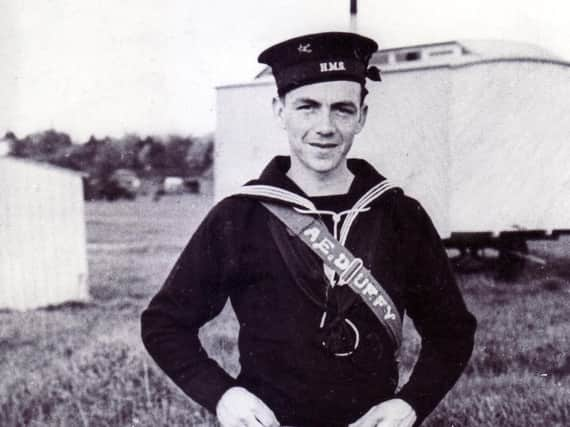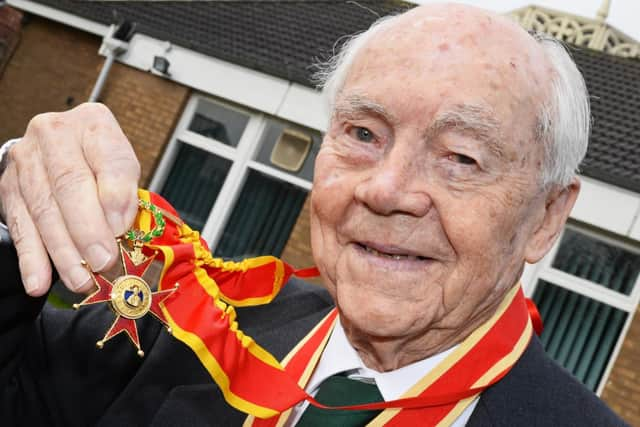The extraordinary life of military chief and former Sheffield MP Sir Patrick Duffy


Where to begin telling the life story of Sir Patrick Duffy, the military chief and former Yorkshire MP who has celebrated his 100th birthday?
Should it start with his illustrious naval career and the serious air crash which left him with injuries so severe, he is still receiving treatment 80 years on?
Advertisement
Hide AdAdvertisement
Hide AdIt could focus on his respected Parliamentary career as former MP for both Colne Valley and Sheffield Attercliffe, as well as being Navy Minister and shadow defence minister.


What about his knighthood from the Queen? His private audience with the Pope? Or that throughout his 80s he annually completed a pilgrimage which involved walking for 35 days?
Sir Pat, courteous, generous and softly spoken, is a gentleman in the truest sense and modest about his incredible life.
Following his naval service in World War Two, including a stint as a combat flier with the Fleet Air Arm, he became a Labour MP and held some of the most distinguished positions in Parliament and international institutions.
Advertisement
Hide AdAdvertisement
Hide AdAs a young pilot, he almost died in a dreadful air crash and was so severely injured he was even given the Last Rites. Despite spending several months on his back in a military hospital, he returned to operational flying.
“I had skin grafts at the time and they really patched me up,” he says, from his home in Doncaster. “All this happened 80 years ago but the doctors keep an eye on me.”
He managed to celebrate his centenary last month despite it happening in lockdown. “I live next door to my sister so we had a table in the garden and had a few drinks so it went all well.
“I received nearly 100 birthday cards so it was a great day – I can’t believe I’m still here,” he laughs. “All I need now is a haircut.”
Advertisement
Hide AdAdvertisement
Hide AdBorn in Wigan to Irish Catholic parents, he says he was “strengthened” in the South Yorkshire coalfield of Rossington where his dad was a miner. He paid tribute to his parents who, in his words, made it all possible.
“I was inspired even as a five-year-old as I saw how the men of Rossington stood firm through seven months of incredible hardship during the General Strike of 1926.
“My dad survived Wigan’s Maypole Colliery disaster in 1908, the First World War, the General Strike of 1926 and 53 years down the pit.
“He was still working underground six shifts a week in his early 70s yet had no legal right to sick pay or holidays until after World War Two.
Advertisement
Hide AdAdvertisement
Hide Ad“When I entered Parliament, mam and dad had no bathroom or indoor toilet, yet as a family we always felt we had everything. Our glass was always half full.”
He says that when war broke out in 1939, the response of the people of South Yorkshire was “stoical” – and remained so even after Sheffield was hit by German bombing raids in December 1940 which resulted in over 600 deaths and more than 40,000 people made homeless.
“There was round-the-clock working right across South Yorkshire in steel, coal and engineering,” he recalls of the war years.
“The armour plating destined for warships, tanks and aircraft was pouring from Sheffield into the war effort as the city became the nation’s armoury. The Royal Navy had an office in Jansen Street.
Advertisement
Hide AdAdvertisement
Hide Ad“Morale remained high, although many families escaped from the Blitz with only the clothes that they were wearing. Yet people didn’t take advantage of public welfare as no-one was cheating. It was Sheffield’s finest hour.”
After giving a false age so he could volunteer, his wartime service started as an ordinary seaman in 1940 and he rose to First Lieutenant.
He transferred to the Fleet Air Arm and by 1946 he was Commanding Officer at the Naval School of Air Radar – never dreaming that one day he would take the chair of the historic board of admiralty.
Following the war, Sir Pat graduated from the London School of Economics and studied his PhD at the prestigious Columbia University, in New York, followed by a lectureship at Leeds University.
Advertisement
Hide AdAdvertisement
Hide AdAfter serving as Labour MP for Colne Valley, he was elected in Sheffield Attercliffe in 1970. He later became First Lord – the political head of the Royal Navy and senior advisor on all naval matters in James Callaghan’s government.
When Labour went into opposition in 1979, he became shadow defence minister and was given Special Branch protection in Sheffield after receiving death threats.
His mother was put under police surveillance after bricks were thrown through the windows of her Doncaster home.
His peacemaking skills led him to play key roles in paving the way for the end of the Cold War and the Good Friday Agreement in Northern Ireland.
Advertisement
Hide AdAdvertisement
Hide AdAs President of the NATO Assembly in the 1980s he had direct contact with the White House, the Pentagon and the Kremlin. Margaret Thatcher broke Prime Ministerial protocol to enjoy his company.
“She insisted at our meetings on pouring me not one cup of tea but two – to the horror of her staff who were watching the clock.”
In 1989 he was invited by Pope John Paul for a private one-to-one meeting in the Vatican and two years later, he received a knighthood from Queen Elizabeth for his contribution to the Western Alliance.
He retired from Parliament in 1992 and was poised to become the Lord Lieutenant of South Yorkshire until the Cabinet Office ruled he was above the mandatory retirement age.
Advertisement
Hide AdAdvertisement
Hide AdInstead, he spent his retirement walking the famous El Camino Santiago de Compostela pilgrimage – a 35-day walk of 25km each day – which he completed six years running.
While he enjoys a tipple, he says his longevity is down to never having smoked, always taking exercise and reading as much as possible.
Warm-hearted and humorous, the only thing he won’t discuss is sport. He jokes: “Thanks to being brought up Irish in Britain and British in Ireland I would unhesitatingly serve both the Queen and the Irish President but when it comes to England playing Ireland at football, please don’t ask me which team I support!”
He says the early years of his life were formative. “I’m grateful for the 1920s in Rossington, the 1930s in Doncaster and the 1940s in Sheffield. When I arrived at Parliament as an MP I felt blessed as well as honoured. I owe so much to the inspiration of the people of Rossington, Doncaster and Attercliffe."
Advertisement
Hide AdAdvertisement
Hide AdEditor’s note: first and foremost - and rarely have I written down these words with more sincerity - I hope this finds you well.
Almost certainly you are here because you value the quality and the integrity of the journalism produced by The Yorkshire Post’s journalists - almost all of which live alongside you in Yorkshire, spending the wages they earn with Yorkshire businesses - who last year took this title to the industry watchdog’s Most Trusted Newspaper in Britain accolade.
And that is why I must make an urgent request of you: as advertising revenue declines, your support becomes evermore crucial to the maintenance of the journalistic standards expected of The Yorkshire Post. If you can, safely, please buy a paper or take up a subscription. We want to continue to make you proud of Yorkshire’s National Newspaper but we are going to need your help.
Postal subscription copies can be ordered by calling 0330 4030066 or by emailing [email protected]. Vouchers, to be exchanged at retail sales outlets - our newsagents need you, too - can be subscribed to by contacting subscriptions on 0330 1235950 or by visiting www.localsubsplus.co.uk where you should select The Yorkshire Post from the list of titles available.
Advertisement
Hide AdAdvertisement
Hide AdIf you want to help right now, download our tablet app from the App / Play Stores. Every contribution you make helps to provide this county with the best regional journalism in the country.
Sincerely. Thank you.
James Mitchinson